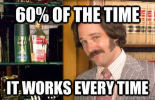Yeah, this. The statement "But the fact remains You likely live longer if you retire after 65" is a classic "USA Today" blunder. You know how years ago, when USA Today always had those "infographics" on their front page? At the time, the annual American Statistical Association meeting used to have an informal contest to see who could present the most egregiously BS USA Today infographic statistic. (What can I say? This is what statisticians considered "fun".) The point is, there were enough of them in a year that were so bad they could spark a semi-serious debate among people who understood that sort of thing as to which among many was the worst. This is that, albeit from Harvard Business Review.
In this case, the lack of a randomized control trial is understandable because of the question of ethics, but it also carries with it
the obligation not to report this the way they do. I mean the title of that article is "You're likely to live longer if you retire after 65", not "Without being able to reasonably control for factors that would confirm or deny the notion of dependence, the best we can say is there is a correlation between age of death and age of retirement". So HBR is being sensational where they should be cautious. Probably 99% of the people who see that headline will take it on faith (why wouldn't you? It's
Harvard after all!) and won't have the understanding necessary to see beyond the implied causality. Another paper by Harvard's neighbor down the road - Boston College - found that "Health is the most important driver of early retirement, followed by layoffs or business closings, and then familial factors. Changes in finances play at most a small role." (Munnell, Sanzenbacher & Rutledge, "What Causes Workers to Retire Before They Plan?" 2015) All of the top three carry with them some degree of hardship or increased stress, which could itself confirm the notion that the relationship between death and retirement is correlative not causal in nature. Just one example of those that, as
@GreenMachine says, counters HBR's research. But even if it was the only one that did so, the fact that it exists and HBR is titling their article in such a sensational way knowing how people consume information in sound bytes these days is a real mark against HBR. They should know better.
I absolutely HATE this kind of nonsense (possibly more so than ever right now because I'm living with this kind of crapy every day at the moment.) It's marketing not science. It's like that absolute shit called the "1% Better Every Day" movement. We had a presentation on that at a work meeting recently and two minutes into it I turned the guy sitting next to me and told him to do himself a favor and stop listening and that whoever chose this for a presentation was an idiot for making us listen to this shit. He asked why and I told him that the concept of "1% better" is the kind of sound byte morons hang on their office walls on a poster but is in actuality a trivially impossible goal. We're supposed to be a group of "data scientists" (i.e., the 21st century term for what used to be a statistician) so we should all know that 1% better is an impossible unsustainable goal. He looked at me like "But it's only 1%" so I gave him an example. I told him to assume you could deadlift 100 lbs. and you set a goal to improve that by 1% every day for a year. The first few days - no problem - you only have to lift 101 lbs on day 1, 102.01 on day two, etc. Do you know what you'd have to deadlift on day 365? 3778 lbs., which is like more than 3 times the world record. Asking for "1% better everyday" is bullshit sloganeering that can only work on people with zero understanding of exponential processes, which is fine for, say, a room full of sales reps whose job is not to understand that kind of stuff, but not something you should expect of a room full of data scientists. And this doesn't even scratch the service on the obvious question related to office work - what exactly IS "1% better" in that arena? Regardless of that, you're still expecting people to be 37.78 times better than they were a year later. Do any of you know ANYONE who is demonstrably almost 40X better at their job today than they were a year ago? Probably not, unless they were essentially tabula rasa a year ago and now have some measurable knowledge. In that veery limited subset of people - yeah, I concede that slapdick's "1% better" goal is achievable.
(BTW, to tie all this back together, the preceding paragraph is why I personally plan to be one of those Harvard says will die early ...)

www.npr.org











